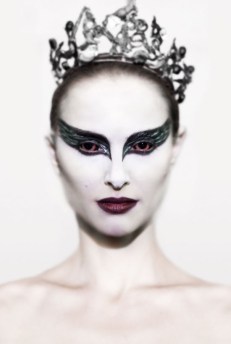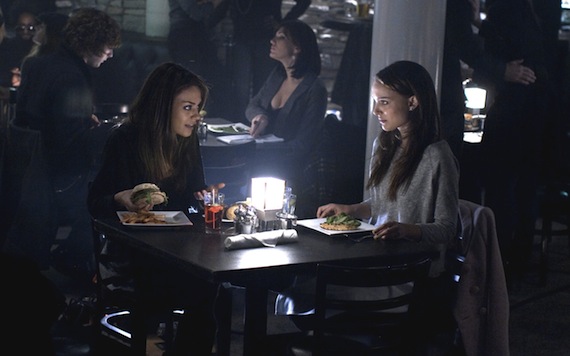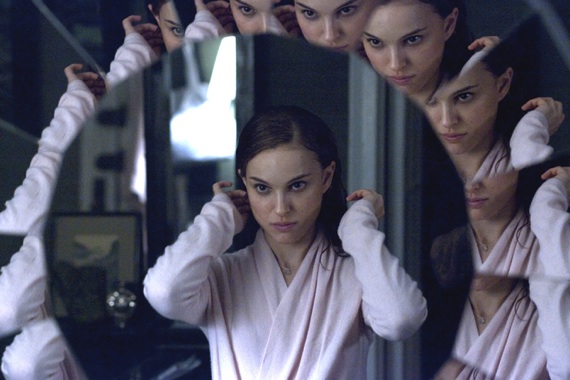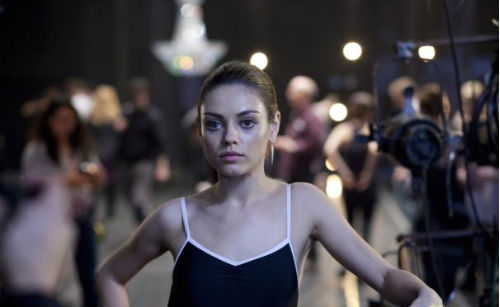 It’s hard to be anyone these days. Hard to be an artist, hard to be a woman, hard to be an emotionally underdeveloped ballerina in a New York City company cracking under the pressure of a million outside forces all while attempting to resist the overwhelming sexual allure of her frenemy in spandex. Characterized as a “psychosexual thriller” (and ain’t that the story of your life), Black Swan is director Darren Aronofsky’s highly-anticipated exploration of sexuality, psychoses, and the dire sacrifices that some of us make for art.
It’s hard to be anyone these days. Hard to be an artist, hard to be a woman, hard to be an emotionally underdeveloped ballerina in a New York City company cracking under the pressure of a million outside forces all while attempting to resist the overwhelming sexual allure of her frenemy in spandex. Characterized as a “psychosexual thriller” (and ain’t that the story of your life), Black Swan is director Darren Aronofsky’s highly-anticipated exploration of sexuality, psychoses, and the dire sacrifices that some of us make for art.
In a dark, gritty, realistic style that borders on too-close-for-comfort, Aronofsky illustrates the re-imagining of a ballet classic, a story within a story recontextualized in a contemporary world. Black Swan re-creates Tchaikovksy’s Swan Lake, taking the peril of the protagonist, Nina (disarmingly executed by Natalie Portman) and mirroring it against the fable of a princess cursed to live as a swan by day, returning to her human form only at night. Princess Odette transforms into the White Swan, an innocent and fair creature who falls in love with her friendly neighborhood prince when he finds her in the woods one night. And just when it seems that true love is poised to break the spell, a sudden obstacle intervenes – and it’s not the homosexual agenda. Odette’s prince is seduced by the Black Swan, her dark double driven by sensuality and cunning. Hopeless and heartbroken, the White Swan throws herself off a cliff, and in death, finds release.
But Black Swan is not a story about love lost. It is instead a story of inner conflict, a mondernized tale of ambition, lust, and pressure, pitting creative and destructive forces against each other in a disturbingly well-executed, mind-bending descent into madness. Aronofsky juxtaposes Portman’s Nina, a qualified but naïve ballerina with Mila Kunis’s Lily, a less precise but effortlessly passionate dancer who threatens to steal Nina’s long-earned spotlight.

The product of a creepily overbearing mother (Barbara Hershey), Nina is a twenty-something young woman frozen in perpetual adolescence, stuffed animals lining the walls of her saccharine pink room and a wind-up ballerina music box lulling her to sleep each night. Cast in the lead role of Swan Lake, Nina embodies the White Swan perfectly but is unable to grasp the seductive technique that defines her counterpart, the Black Swan. Unsurprisingly, this is where Lily enters, effortlessly dancing her way into Nina’s territory…as well as company director Thomas Leroy’s pants.
Conveyed almost unsettlingly well by Vincent Cassel, Thomas is the force driving his ballerinas’ performances, motivating them through manipulation of sexuality. And while understanding one’s own sexuality is an integral part of development, especially in a field that puts such great emphasis on the nature and condition of bodies, the problem is that Thomas is a predator, taking advantage of his power position and using the women’s sexuality to satisfy his own. What is perhaps most unsettling is the truth in what Thomas says. In order to succeed, Nina must become more in touch with herself (not just like that) and discover a certain darkness and truth within herself that requires a mature command over her own identity.
Instead of being given the opportunity to grow into herself, Nina is stifled by a number of factors that hinder her development and her independence. Suffocated by a mother compensating for her own lost dreams, Nina views ballet less as a performative art driven by passion and more as a channel through which she can obsessively strive toward perfection. Pushing her body to the point of breaking, Nina is able to justify a variety of unsavory habits – including self-injury and bulimia – to achieve what she and those around her regard to be her very best.

What’s most impressive (and most horrifying) about it all: you believe her. Perhaps you don’t see dark ghosts of yourself reflected in giant floor-to-ceiling mirrors or hallucinate black feathers growing out of your skin, but the pressure to achieve perfection through physical beauty – no matter how harmful or painstaking the cost – is entirely too relatable. Yes, Nina’s madness is exaggerated, but her obsessions are common. As an audience, we watch Nina spin out of control, fostering destructive habits and forming dangerous relations. But at the same time there are parts of us that identify and even root for her, relating to her as a damaged individual attempting to assert her delayed independence.
Portman, who has already proven her credibility as an actress several times over, gives her best performance to date, reaching into a deeper, darker place than ever before, convincingly conveying profound conflict while remaining realistic and accessible. Kunis, mostly known for her less serious roles in That 70’s Show, Family Guy, and Forgetting Sarah Marshall, steps her game up with an ease that demonstrates her diverse talents as she falls in brilliantly alongside her already-acclaimed co-stars. The impeccable casting adds an elevated element of reality to a film that already hits so close to home.
Aronofsky masterfully documents an individual’s descent into madness, calling into question whether Nina’s deterioration is insanity at all or a skewed interpretation of coming into one’s own all too late. He blurs the line between the pursuit of art and the pursuit of perfection, reflecting in the storyline and in the greater concept of the movie itself the sacrifices we make for artistic genius. The fears that he instills in us are most profound because they do not apply exclusively to fictional ballerinas, they are fears that result from the pressures of everyday life. He exposes us to the harsh truth that glory is fleeting and to the haunting paranoia that one can be replaced. We wonder if Nina is succumbing to an outside madness or if she is growing into a madness that already exists, not just in her but in each of us. Perhaps she is insane, or perhaps she is the inevitable product of an insane world. Is she insane all on her own, or is she the inevitable product of an insane world?

And as for the love scene: yeah it’s there, but it’s not the point. Portman has already made public statements expressing discomfort over the unfair emphasis placed upon that particular aspect of the film, and these concerns are warranted. Are Portman and Kunis two exceedingly fine ladies that we’d love to see get down? Of course. But the scene is more than just an ecstasy-fueled lesbian love sesh, it’s an exploration of the protagonist’s suppressed psyche serving up curveballs later down the line.

Black Swan, despite garnering overwhelmingly positive reviews, has also attracted criticism for its lack of subtlety and its occasional submission to clichés, but underneath this lies the fact that cliché is often based in truth, and that the truth is often disturbing.



Katrina,
This is the single best film review I have ever read–truly insightful, descriptive, well-crafted, alluring and explanatory without being condescending. Brilliant job ! (50 points to Gryffindor)
And: psychosexual thriller–(and ain’t that the story of your life)=BEST
speaking of that, a friend of mine at brown uni. said one time when emma watson answered a question in a lecture someone yelled 50 POINTS TO GRIFFINDOR and luckily she though it was hilarious (really, how could you not laugh at that)
oh my god that is so funny period
My friend was in that class! Apparently she stormed out close to tears, if I were her I would’ve just saluted that person’s brilliance.
Great review.
We just need the Julie and Brandy re-enactment!
agreed, this is a really thoughtful review. you state a lot of what i felt about this movie that i couldn’t articulate. i really liked this movie, and all my girlfriend will talk about (as a former ballerina) is how natalie portman had weak swan arms and no one could POSSIBLY BELIEVE they would cast someone with weak arms as the swan queen – THE HORROR. i keep wanting to talk about the madness and the pressure and the emotional destruction of this girl, and all she sees are the weak swan arms. anyway, i think your insightful analysis will help, thanks!
so when i first heard about this movie, my main feeling about it was MILA KUNIS MILA KUNIS MILA KUNIS ON A GIANT SCREEN IN THE THEATER, YES. after reading this review, though, i now desperately want to see black swan- it sounds dark, thought-provoking, and generally right up my alley.
also, mila kunis on a giant screen in the theater! that feeling still burns strong, unsurprisingly.
Can’t wait to see this.
Now I want a burger…
This is one of the most detailed and well-written reviews I’ve read of Black Swan, and I’d read quite a few. Already a fan of Aronofsky and Natalie Portman’s work, I have seen the film twice. It touched home on a lot of levels, and it is exactly that psychosexual madness or dark and emotion driven kind of film (Requiem for a Dream, The Dreamers, Shutter Island, Trainspotting) that I truly relate to. Nina’s striving for perfection while walking the fine line between insanity and clarity are perfectly embodied by Portman; depictions of self harm and eating disorders, coupled with her rapid descent into madness are all too familiar.
Visually, it’s a stunning film, with excellent use of light and mirrors that creates a mood of darkness and desire.
Black Swan is not for the faint of heart, but I think its one of the best movies I’ve seen in the last two or so years…
I wanted to see this movie and after this review I really really want to see this movie. I wish it was playing near me :(
Hopefully it’s still playing when I go to the bat area for xmas
i know the feeling!
katrina’s alive! and writing really good things!
this is the best review of this movie, by far.
Watching Nina self-harm was horrifying and made me self-conscious of my own issues with that.
i’m sorry if your experience with this movie was negative (though i guess your below comment would prove contrary), and i’m sure you’re not alone in feeling this. i thought aronofsky did a pretty good job presenting self-injury as horrifying without being condescending. as in, like “isn’t it horrifying that societal pressure drives people to this” instead of “man, what a freak.” still though, that element was not necessarily something i was expecting to see going into that movie, and i think that’s probably because there was a strong marketing emphasis placed on certain things (hmm) that the movie was not at all about instead of other issues that the movie more thoroughly addressed.
i can relate to that. i found the movie really triggering for both self injury and sexual assault and had a pretty massive panic attack afterwards. most of my friends enjoyed the movie, but it was way too real and too heavy for me.
i’d be conscious of the themes if you are easily triggered for self injury, eating disorders, or sexual assault
wow well done review! exactly how i felt. alot or complaining about the story being convoluted but i thought it played into the whole theme of the film
Excellent review in general.
Forget the film (which I plan to see). You write with such style, simplicity and personality, it’s a breath of fresh air.
You should be applauded. I’ve read many reviews and this is the best by far.
And I’m not even a lesbian, which let’s you know, it shouldn’t even matter.
Talent is talent.
my life IS a “psychosexual thriller!”
Katrina, great review. Just one thing – I don’t recall Lily sleeping with or saying she sleeps with the ballet director. She states she slept with a guy from the club when Nina confronts her the morning after Nina thinks her and Lily made love. Later she is seen by Nina touching a ballet dancer on the crotch but there is a great chance this is also a hallucination on Nina’s part.
Hope you review more films. Great work!
i believe nina walks in on them in the studio as she’s practicing/losing her mind the night before swan lake opens. i took it literally, but now that you’ve pointed it out, it does seem pretty valid that it could have been a hallucination. but i guess that’s the point; real or imagined, witnessing this was nina’s breaking point in which she watched her ‘prince’ (her dirty, pervy prince. wow this film was great at putting swan lake into a new context)choosing her dark counterpart. at that point, reality is practically subjective and the action is driven mostly by her reactions. ya dig?
either way, thanks for pointing it out!
If we analyze the film in depth we can make another interpretation…
Note that Lily is a person with great inner energy,besides being very sensual, and it can be disturbing
for persons like Nina. Nina is ordinary, self-jailed,
with strong but undefined sexuality.
I think the fantastic scenes aren’t the product
of insanity at all but a metaphor for Nina’s confused mind.
Nina is weak but feels perfectly Lily’s strength and particularity. Cos Lily is a genuine Black Swan, the other side of Nina’s personality. So Lily is a kind of symbol.
It seems to me that the pill is a very important motif
in this film. The pill guaranteed us a double reality…and
we can believe that the famous sex really happened between them and tomorrow Lily pretends…
This film is undoubtly a great double-coding story
and we cannot say that it treats mental illness,
it is more probably it treats mental impasses,labyrinths and symbols
and offers us a subtextual message.
Perheps Lily is insane ;)
This was a great film review, thank you. It critiques the movie well without giving too much away for those who haven’t seen it (me). I want to see this movie for many reasons, but mostly because I’m a big fan of Aronofsky’s films. Your review, makes me want to see it even more.
I really appreciate that you wrote a real, well-written review that wasn’t all about “The Scene” and hyping it up for us lesbians. Thanks for that. I was getting frustrated with how this movie was being reduced to just that one fucking scene by other queer sites as if that was the only reason to go see it. This review actually beats alot of the more famous critic reviews I’ve read as well.
thanks! yeah, i was getting frustrated about that as well. it sucks to see queers buying into marketing for things that are basically TOTALLY irrelevant. if anything we should be applauding black swan for being a well-done film that doesn’t shy away from addressing female sexuality. the queer community isn’t shallow (giant blanket statement), so why should we react to media with such a one-dimensional lens?
It isn’t just queer sites though!! Most of the reviews or really anything I have seen on this movie in regular media seems to be about that one scene. I am so glad someone actually gave me a review with more to it!
this sounds absolutely amazing…
just one question–is this an acceptable thing for a babygay to see with her parents?
Ha. I would say nooooo — but not because it’s “too gay” or anything really, just because it is really unsettling. (Well, and I might feel weird watching the masturbation scenes with my parents, but maybe that’s just me.)
I had a really intense reaction to this film. Frankly, I thought the writing and most of the ideas were just kinda dumb (black/white good/evil duality = snoozefest), but it all was executed so viscerally. It really replicated this feeling of being under constant attack — in any sense, but especially just *as a woman* moving through the world being looked at — very very well for me.
yeah, that was kind of what I figured when I read self-injury and such…
i would watch this movie, but i heard that there were scenes where nina’s hurting herself via nail cutting, and well, just ouchie. yes, i am a five year old.
I agree with owls. at first i was like “oh please. enough with the wispy voiced, anorexic ballerina with an obsessive mother and a pervy instructor” and the whole “black/white, innocence/sexuality” themes. However, I was won over. Sometimes a cliche can be done well. I am also a fan of Aronofsky, and I think this measures up.
Wanted to love it, thought I would hate it, ended up loving it. It’s so nice when that happens.
I’m glad this film is cinematically significant and everything, but I have to say all I really wanted for Christmas was “Center Stage II: Dykes in Tights.”
THAT WOULD BE THE BEST MOVIE EVER. i’ve never wanted anything i never knew i wanted and could also never have this bad!!!
This is as hot as you, KC.
mhm say it to me maggydanger.
I saw this movie on Tuesday and I thought my brain had melted. I was on the edge of my seat the whole time and don’t think I took a real breath until the final scene. This review was excellent and spot on. Good Job!
I agree, when it was over, my friends and I looked at each other with wide eyes and we all said “WHAT THE HELL JUST HAPPENED? THAT WAS FANTASTIC!”
OH MY GOSH!!!!!!!! I cant wait to see this movie!
i wish the movie was as good as this review. :)
LOL. I have to agree with you Becka. This is a great review, however the movie left me wanting more. It was very predictable and painfully obvious.
Portman was good, as usual, but there was nothing exceptional about this. The heavy use of color symbology, the use of body wounds and breaking the skin as a metaphor for sanity, overbearing mother, repressed feelings, suicide, etc; was just kind of..ugh.
I feel like Aronofsky was trying so hard to mindfuck us but he wasn’t even in…smh
Saw it tonight finally. This is a flick which is best viewed/experienced in a theater. Most visually stunning films are,no?
I too barely breathed until the last scene. I kept thinking how dancers basically have to surrender to a life of torture, and how this twists everything else they perceive as reality… I’ll say one thing. This movie grabs you and doesn’t let go.
Wow, great review. :)
how about Winona Ryder??
Yes. I thought the decision to cast her was perfect. In real life she is still relatively young and beautiful in my opinion, but when she made her first appearance on the screen, I was like WHAAT WYNONA?! I was completely surprised to see her because she used to be such the sweetheart of the screen, and now she has all but disappeared.
It reminded me of the way Tarantino made Pulp Fiction by finding recently fallen stars who were desperate for work in order to keep his budget down but his names big.
Cool parallel between film character and actual actress, basically.
and WTFFACESTABBING!!!
I think after all is said and done, it is really Nina who is the black swan and Lily who is the white swan. Because ultimately it is Nina who would be driven to do terrible things, whether or not she actually does them. And even after it all Lily knocks on her dressing room door and is sincere and nice.
i hated this movie. obvz i should have read this review first because all i knew was that it had some lesbian scene & was about a traumatized ballerina. i lived with dancers in college & i thought: oh, she’ll be bulimic, & was wholly unprepared for the level of trauma i then endured.
THIS IS WORSE THAN BULIMIA PEOPLE
also it touched upon my worst fear, aside from sprouting black wings out my arms, which is to get my hand slammed in a door. the horror!!!
also the lesbian scene was creepy, drug-induced, weird, and i guess did not actually happen ?
This movie is absolutely brilliant. It’s such a literal interpretation of Swan Lake, done in such an intense manner that you can’t look away.
Just know that if there are children walking around with those little light up shoes in the theater like there were when i saw it, you will want to smack their parents.
Winona Ryder was phenomenal. Only a few scenes and she owned every single one of them.
This movie impressed me. The representation of duality black/white, crazy/sane, repressed/open just really intense. I thought the pacing was good and the casting was spot on. I think Mila Kunis really stole the show, her intensity contrasted to how natalie portman was able to embody the scared fragile nina was just amazing.
I really enjoyed this film! Aronofsky does crazy really, really well. (Pi anyone? Anyone?) It was well written, wonderfully cast and excellently executed. Natalie and Mila were both absolutely stunning to watch in every scene. As a former dancer myself, I consider it a huge plus when any dance film the actor’s face can visibly be seen instead of some artsy angle or blur to cover the real dancer’s face.
I wish I could have enjoyed it. I was reminded too much of someone that I just don’t want to think about. If not for that, I’m sure I would have enjoyed the movie.
Too many white people.
Too much reading by many into a bad movie and the audacity to compare it to THE RED SHOES. Natalie Portman is a brilliant actress and the rest of the cast ably supports her. As for the scenario it is the story a fragile psyche descending into paranoid schizophrenia. Whether she is a ballerina or not she would have gone insane. The ballet did not make her do it! What is so unclear is the result of Mr. Aronofsky’s seeming inability to visually separate her real world from her mad one for us. The cruelty of her choreographer, the conniving of her rival, the control of her mother all exist within the framework of her paranoia. None of it is real. It is only the manifestation of her disorder and since the director chooses to see the world from Nina’s point of view we see her distorted view of reality. More than 2/3 of the film is genuinely boring and unmoving because cinematic tricks and poor choices. Nina is a goal-oriented, inhibited, inexperienced mama’s girl, a sexually-repressed virgin and a perfectionist as such she would not allow herself to pop pills and alcohol and have sex in a public. The scene in the cab, the lesbian cunnilingus we learn after viewing are scenes which are manifestations of her illness. Perhaps Mr. Aronofsky should have watched THE SNAKE PIT and Roman Polanski’s REPULSION before beginning his film. Nina’s descent into madness might then have rung true. I saw the film at a screening in NYC. At the end when the credits were shown Ms Portman got a healthy round of applause from the audience and when Mr. Aronofsky’s name appeared applause was noticeably nonexistent.
Pingback: 12 Thrillers and Action Films With Lesbian and Bisexual Characters, Ranked – Autostraddle – lgbt-99.com